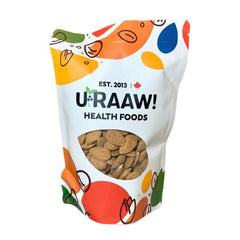







Description
xGrown in California’s ideal Mediterranean climate, these almonds are a perfect blend of sweetness, rich flavor, and just the right amount of crunch. As the world’s largest almond producer, California supplies 80% of the global almond market, making these nuts a staple in healthy, diverse diets worldwide.
These natural, raw, unsalted almonds are a powerhouse of nutrients, including healthy fats, magnesium, and vitamin E. Perfect as a snack or as an addition to your favorite recipes, California almonds are a wholesome replacement for less nutritious options.
What Makes Almonds So Special?
Almonds are the edible seeds of the Prunus dulcis, or almond tree. Though technically not true nuts, their versatility, flavor, and nutritional benefits make them one of the most popular "nuts" globally. California almonds stand out for their sweetness, crunch, and nutrient density, making them ideal for snacks, baking, and cooking.
Nutritional Profile
California almonds are packed with essential nutrients:
- Vitamin E: 37% of the RDI per 1-ounce serving (28g)
- Magnesium: 20% of the RDI
- Protein: 6g
- Fiber: 3.5g
- Healthy Fats: 14g total, with 9g being heart-healthy monounsaturated fats
A 1-ounce serving contains 161 calories, but research shows your body doesn’t absorb 10–15% of these calories due to some fats being inaccessible to digestive enzymes.
Potential Health Benefits
Almonds aren’t just tasty—they’re loaded with benefits that support overall health:
1. Protects Against Oxidative Stress
Rich in antioxidants, almonds help protect your cells from oxidative stress, which is linked to aging, inflammation, and chronic diseases like cancer.
2. Promotes Heart Health
Almonds’ high vitamin E content supports heart health by reducing LDL cholesterol levels, a major risk factor for heart disease. Studies show that eating 1–2 handfuls daily can significantly improve your cholesterol profile.
3. Supports Blood Sugar Management
High in magnesium, almonds can help regulate blood sugar levels. Research indicates that magnesium-rich foods may lower insulin resistance and improve glucose control, benefiting those with or at risk for type 2 diabetes.
4. Aids in Weight Management
With their high protein and fiber content, almonds keep you feeling fuller longer, reducing hunger and overall calorie intake. Additionally, almonds may boost metabolism slightly, supporting weight loss efforts.
5. Lower in Arsenic
Compared to other rice-like grains and nuts, almonds have lower arsenic levels, making them a safer choice for frequent consumption.
California Almond FAQ
Q: Are almonds rich in vitamin E?
A: Absolutely! Almonds are among the world’s best sources of vitamin E, providing 37% of the RDI per ounce.
Q: Are almonds a good source of magnesium?
A: Yes, 1 ounce of almonds contains 20% of the RDI for magnesium.
Q: Should almonds be soaked?
A: Soaking almonds removes phytic acid, improving nutrient absorption and digestibility.
Q: Can California almonds be sprouted?
A: No, due to pasteurization. If you’re looking for sproutable almonds, try unpasteurized varieties like Spanish almonds.
Q: How do California almonds compare to Spanish almonds?
A: California almonds are sweeter and crunchier, while Spanish almonds have a slightly softer texture and richer flavor.
How to Enjoy California Almonds
- Eat them raw as a nutritious snack.
- Add them to granola, trail mixes, or salads for extra crunch.
- Use them in baking for cookies, cakes, or almond flour.
- Blend into almond butter or almond milk for homemade alternatives.
California almonds are not just a snack—they’re a nutritional powerhouse that supports heart health, blood sugar control, and weight management. Whether enjoyed on their own or as part of your favorite recipe, these versatile nuts are a delicious way to boost your health.
- Choosing a selection results in a full page refresh.


